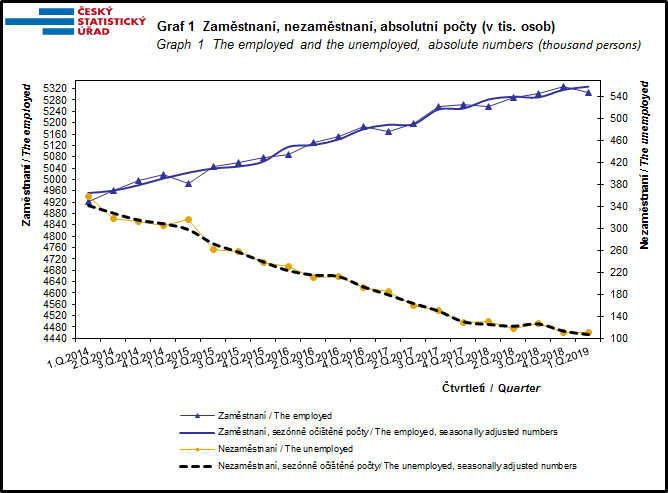
Full Employment, But Still Vacancies
Unemployment fell in April by 0.2% to 2.1% (Czech Statistical Office); the number of people in employment also fell (by 0.2%): salaries are also rising and there are still plenty of vacancies. Good for workers but experts say that the future trend will be worsening unemployment. Photo credit: Pixabay.
Written by Charles du Parc.
Czech Rep., Jun 11 (JS) – From the high level of nearly 7% reached in 2014 following the financial crisis, unemployment has declined to the current low levels around the two percent mark. This has triggered comments by economists such as Radomír Jáč, Chief Economist of Generali Investments CEE that full employment has been reached (E15, June 10). Indeed the 2% mark has been widely regarded as the bottom limit of unemployment as there is always a small core of people who remain as long-term unemployed and other people moving between jobs.
“This was originally felt in the IT sector but is affecting lower skilled jobs as well, with supermarkets such as Lidl and Penny Market raising monthly salaries close to 30,000 Czech crowns (around 1,170 Euro).”
So is it fair to say that the Czech Republic is in this situation? I think there are two main indicators reinforcing this opinion; firstly there is anecdotal evidence that employers are finding it difficult to recruit and secondly wages are increasing at an annual rate of around 7%, well above inflation. This was originally felt in the IT sector but is affecting lower skilled jobs as well, with supermarkets such as Lidl and Penny Market raising monthly salaries close to 30,000 Czech crowns (around 1,170 Euro).
Chart: Number of the (un)employed in the Czech Republic, from Q1 2014 to Q1 2019.
Source: Czech Statistical Office.

The latest figures are in line with this; some articles will quote a higher figure of 2.6% (May 2019), which is from the Department of Employment and calculated differently. However, the trend is similar. The 0.2% drop is mainly due to seasonal employment in the agricultural and tourist sectors. It is pretty uniform across all regions with only Prague showing signs of stagnating. At the moment there are still plenty of job vacancies. Therefore the low unemployment levels are expected to continue for most of this year.
“The Czech Republic is fairly inflexible compared to more open job markets like the UK.”
Beyond that the picture is expected to worsen. As the chief economist of Czech Fund Lukáš Kovanda points out, the labour market in the Czech Republic is fairly inflexible compared to more open job markets like the UK. This means that as the economy slows down , it will not affect employment for several months or even years. There are already signs of the economy slowing.
The confederation of Czech Industry expects demand to worsen and other forecasts tend to the neutral or negative beyond this year. However, as the Czech economy is heavily influenced by its external trading partners, especially Germany, it may be the situation there that determines what the Czech Employment situation is in 2020.

